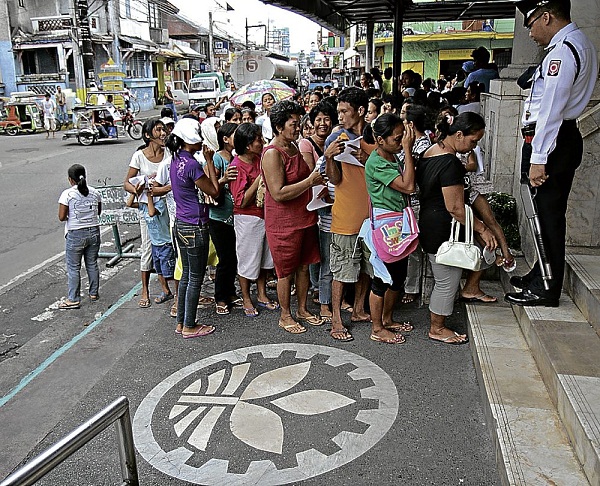
QUEUES by beneficiaries of the government’s cash transfer program have become a familiar sight where the program is being implemented, like in Mauban, Quezon, where the local Land Bank of the Phils. branch gets filled with cash claimants every month. DELFIN T. MALLARI JR/INQUIRER SOUTHERN LUZON
MANILA, Philippines — The country’s economic managers are urging the next administration to expand the conditional cash transfer (CCT) program, saying the Aquino government has made gains in reducing poverty with the CCT.
In a statement Sunday, Finance Secretary Cesar V. Purisima said the country “must stay the course” in poverty reduction by widening the coverage of the Pantawid Pamilyang Pilipino Program (4Ps) in the next six years.
“An expansion of the CCT is imperative to cover the transient poor families, currently at 9 percent of the population, who remain at risk of falling back below the poverty threshold due to illnesses and disasters,” explained Purisima, also the chairman of the economic development cluster.
The finance chief expressed confidence that the results of the 4Ps would “be seen exponentially clearly in time.”
“The children of those who have been covered by 4Ps are healthier and more educated, widening the field of opportunity and empowering them to break free from the poverty trap,” Purisima said.
Also, Purisima urged the next administration to “continue to pursue financial inclusion initiatives such as micro-insurance and building a credit information system along with movable collateral registries—which will give the poor and micro businesses access to finance and opportunity.”
“Along with maintaining peace and stability, universal health care and universal K-12 education are integral components to the country’s inclusive growth strategy. The government remains firm in its commitment to making significant investments in these areas empowering generations of Filipinos to live a life free from poverty,” Purisima said.
Last week, the Philippine Statistics Authority reported that the poverty incidence slid to 26.3 percent as of the first half of 2015 from 28.6 percent in 2009 or before President Aquino led the government.
“Poverty reduction has been fairly broad-based, with improvements in real incomes becoming more progressive. Per capita income growth for the bottom 30 percent of households, at over 20 percent in 2012-2015, was much faster than the average growth for all households (15.3 percent) and even faster compared to the top 20 percent of households (about 13-percent growth),” Socioeconomic Planning Secretary Emmanuel F. Esguerra noted.
However, economic managers said that moving forward, “downside risks remain as disasters and shocks threaten the poor, with food inflation putting the most pressure.”
“Three of the most destructive typhoons happened over the last four years. From 2011-15, 94 typhoons visited the country, 9.3 percent more than the number of typhoons during 2006-2010. Damage from these typhoons has tripled to P242.9 billion in 2011-2015 compared to the previous five years,” they noted.
“Without the social safety nets we have painstakingly expanded due in large part to our wider fiscal space, poverty would have gotten much worse,” Budget Secretary Florencio B. Abad said.
“Poverty is a multi-headed monster, the most wicked of the problems we face as a people. While we have enough humility to know that one administration cannot do it alone in just six years—indeed, it takes an entire nation to come together—we are likewise optimistic enough to keep the faith in our work to uplift those at the margins from poverty,” the budget chief added.
“Today, millions of Filipinos now live with less pain, less poverty, and with more hope and freedom. The enduring work against poverty is never over. This is precisely why it is important for all to be vigilantly critical and intellectually demanding of those who wish to lead this nation for the next six years,” Purisima said.
“Whether we succeed in lifting more Filipinos up from the reins of poverty or fall back on the mistakes of the past lies in the hands of every voter. Our active and responsible participation in our vibrant democracy is part and parcel of our work against poverty. We are confident the momentum to step forward is now greater than the inertia to fall back,” the finance chief added. SFM